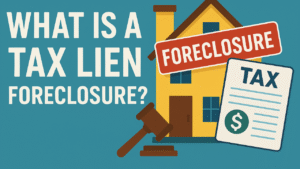 What Is a Tax Lien Foreclosure? Everything You Need to Know
What Is a Tax Lien Foreclosure? Everything You Need to Know
If you’re a property owner or real estate investor, it’s important to understand what a tax lien foreclosure is and how it can impact property ownership. This often-overlooked process can lead to the loss of a property due to unpaid property taxes. In this blog post, we’ll explain what a tax lien foreclosure is, how it works, and what it means for homeowners and investors alike.
What Is a Tax Lien?
A tax lien is a legal claim made by a government entity against a property when the owner fails to pay property taxes. When taxes go unpaid, the local government places a lien on the property, essentially securing the unpaid debt with the property itself. This lien gives the government the right to eventually take action to recover the money owed.
How Does Tax Lien Foreclosure Work?
Once a lien is placed on a property, the government may choose to sell that lien to investors in a tax lien certificate sale. These investors pay the overdue taxes on behalf of the property owner and in return receive the right to collect that debt — often with interest.
However, the property owner still has a chance to save their property during what’s known as the redemption period. This period, which varies by state, gives the owner time to repay the taxes, plus interest and penalties, to either the government or the investor who purchased the lien.
If the property owner fails to pay within the redemption period, the lienholder has the legal right to initiate a tax lien foreclosure. This allows them to either take ownership of the property or sell it at auction to recover the debt.
Why Do Tax Lien Foreclosures Happen?
Tax lien foreclosures happen because local governments rely on property taxes to fund essential services like schools, police, and infrastructure. When property owners don’t pay their taxes, the government uses tax liens and foreclosures as a way to recover those funds and keep services running.
Risks for Homeowners
The biggest risk for homeowners is losing their property over a relatively small amount of unpaid taxes. Unlike mortgage foreclosures, tax lien foreclosures can occur even if the homeowner is current on their mortgage payments. Once the redemption period ends, it can be extremely difficult to reverse the process.
Opportunities for Investors
For real estate investors, tax lien foreclosures can present opportunities. Purchasing tax lien certificates can yield high interest rates — sometimes between 8% and 20%. In some cases, investors may even acquire properties for a fraction of their market value. However, investing in tax liens requires careful research and understanding of local laws.
Final Thoughts
Tax lien foreclosure is a powerful tool used by local governments to enforce tax collection. For property owners, it’s a warning to stay current on property taxes. For investors, it’s a niche opportunity that can be profitable — but also complex and risky.
If you’re facing a potential tax lien on your property or considering investing in tax lien certificates, consult with a real estate attorney or tax professional. Understanding the tax lien foreclosure process can help you avoid costly mistakes and make informed decisions.